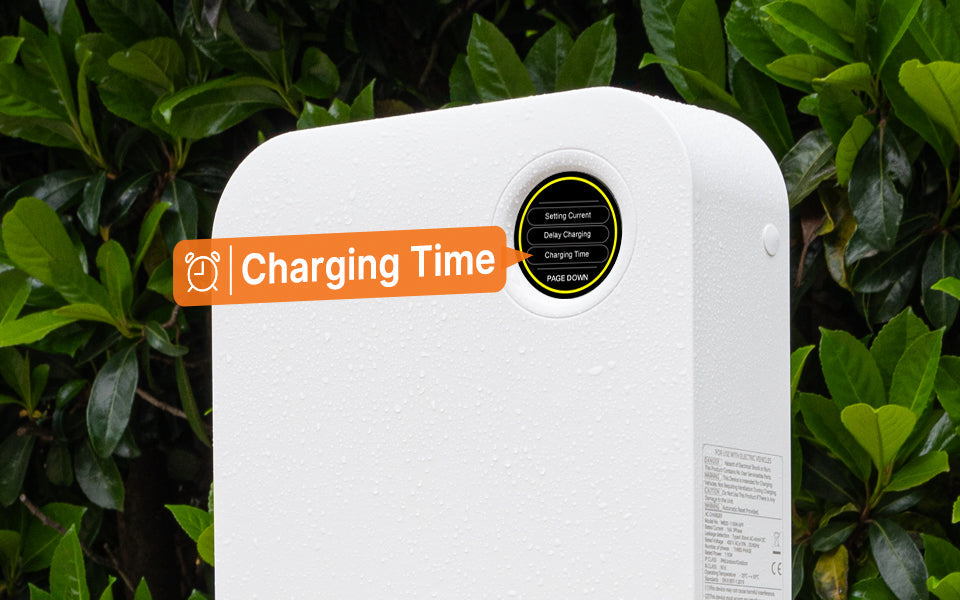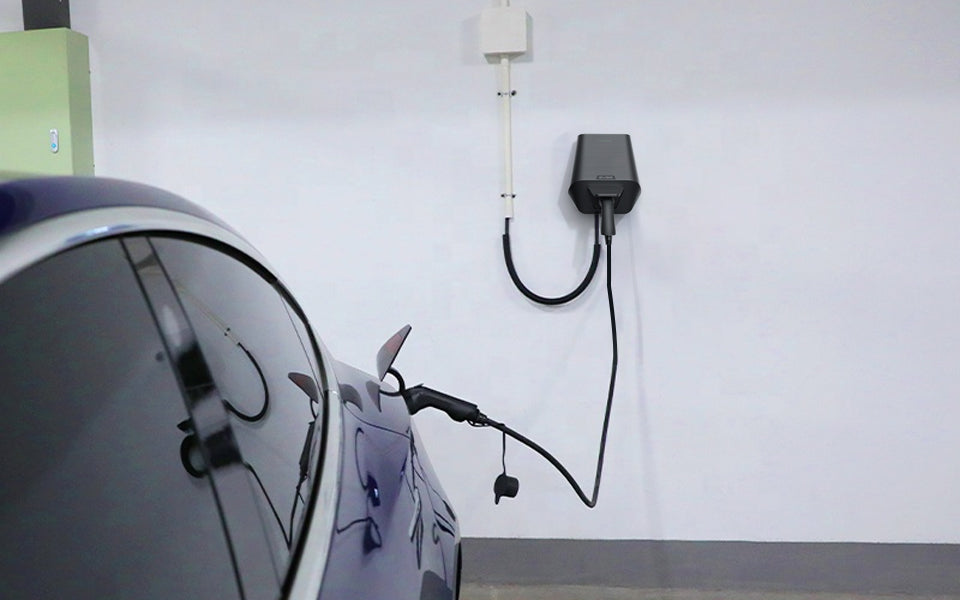One of the most frequently asked questions from users is: "How long does this charger take to charge my car?" In reality, charging time is influenced by several factors, including battery capacity, charger power, vehicle limitations, ambient temperature, and more. This article provides a comprehensive breakdown of these factors and offers estimated charging times under various charging power levels to help users better plan their charging routines.
1️⃣ EV Charging Power Types and Estimated Charging Time
EV charging methods vary significantly, and so does the time required. The following outlines common charging power types with typical usage scenarios and estimated charging time (based on a 60 kWh battery from 0% to 100% theoretical charge):
🟢 Slow Charging (Mode 2: Portable EV Chargers)
Power: Approx. 2.3KW - 10A / 3.6 KW - 16A
Use Case: Standard household plug, no installation required
Time: Approx. 26 / 16 hours to full charge
Features: No special equipment needed, low cost, but it has an extremely long charging time, not suitable for frequent use.
🟢 Enhanced Slow Charging (Mode 3: Wallbox Chargers)
Power: 7.4KW - 32A
Use Case: Dedicated home charger installation recommended
Time: Approx. 8 hours to full charge
Features: Suitable for overnight home charging with better safety
🟢 Fast AC Charging (Public Three-Phase Chargers)
Power Range: 11 KW - 16A 3Phase / 22 KW - 32A 3Phase
Use Case: Street-side stations, commercial or workplace parking
Time: 3–6 hours to full charge
Features: Widely available; suitable for daytime or destination charging
🟢 DC Fast Charging (Rapid Chargers)
Power Range: 50 KW, 100 KW, 150 KW, 250 KW and above
Use Case: Highway service stations, superchargers
Time: 20–60 minutes to charge from 10% to 80%
Features: Ideal for long-distance travel and quick top-ups
🟢Daily-usage Considerations:
- The actual charging time may be longer due to energy losses, around 90% charging efficiency, and slower charging near full capacity.
- If you're charging from 20% to 80%, it typically takes about 60% of the full charging time.
2️⃣ Key Factors Affecting Charging Time
Even with identical charger output, EVs may charge at different speeds depending on internal and external factors. Here are the main elements that influence charging time:
🟢Battery Capacity
Larger capacity = more energy = longer charging time
Examples:
40 KWh battery with 11 KW charger → About 3.6 hours
80 KWh battery → About 7.3 hours
Daily-life usage usually involves partial charging (e.g. 10%–80%)
🟢Onboard Charger Limit
Determines the max AC power your car can accept
If your car only supports 7.4 KW AC, it won't benefit from a 22 KW charger
Typical values:
Small cars: 7.4 KW
Mid-size/luxury: 11 KW
Exceptions (e.g. Renault Zoe): up to 22 KW
🟢Charging Station Output
Actual output may vary due to grid load, shared connections, or network limitations
Public chargers may reduce power dynamically based on usage.
🟢Battery Management System (BMS)
Controls charging process for safety and longevity
Often reduces power after 80% SOC to protect battery
Even fast DC chargers will slow to trickle charge near the end
🟢Ambient Temperature
Cold weather slows down battery chemistry
BMS may restrict charging power to prevent battery stress
Some vehicles (e.g. Tesla, BMW) preheat the battery before fast charging
3️⃣ Estimated Charging Times for Common EVs in Europe (10% to 80%)
|
Model |
Battery |
Onboard AC |
2.3kW Home Plug |
7.4kW Wallbox |
11kW AC |
50kW DC |
150kW DC |
|
Tesla Model 3 SR+ |
55 kWh |
11 kW |
~17 hrs |
~5.5 hrs |
~4 hrs |
~45 min |
~20 min |
|
Volkswagen ID.3 |
58 kWh |
11 kW |
~18 hrs |
~5.5 hrs |
~4 hrs |
~45 min |
~22 min |
|
Renault Zoe R135 |
52 kWh |
22 kW |
~16 hrs |
~5 hrs |
~3 hrs |
~45 min |
~22 min |
|
Hyundai Kona EV |
64 kWh |
11 kW |
~20 hrs |
~6 hrs |
~4.5 hrs |
~50 min |
~25 min |
|
BMW i4 eDrive40 |
83.9 kWh |
11 kW |
~26 hrs |
~8 hrs |
~5.5 hrs |
~1 hr |
~30 min |
|
Peugeot e-208 |
50 kWh |
11 kW |
~15 hrs |
~5 hrs |
~3.5 hrs |
~45 min |
~20 min |
|
Skoda Enyaq iV 80 |
77 kWh |
11 kW |
~24 hrs |
~7.5 hrs |
~5 hrs |
~1 hr |
~30 min |
Note: All times are estimated based on typical BMS behavior and environmental conditions. Daily-life results may vary based on starting SOC, charger condition, temperature, etc.
4️⃣ Summary and Practical Recommendations
To make the most of your electric vehicle experience and optimize charging time, here are detailed suggestions based on user profiles and usage scenarios:
🟢For Daily Commuters:
Install a 7.4 kW or 11 kW wallbox charger at home. This allows overnight charging, ensuring your car is ready every morning.
Charge between 10% and 80%. This range helps preserve battery health and meets daily driving needs.
Plan for weekends or long errands by topping up to 90% in advance.
Morec Recommendation:
- 7KW Portable EV Chargers With Timing Functions
- APP-controlled 7KW EV Charging Stations
- 11KW Portable EV Chargers
- 11KW Wallbox Chargers

🟢For Long-Distance Travelers:
Choose EVs that support 100 KW or higher DC charging. This is essential for minimizing stopover time on highways.
Use fast-charging networks strategically. Your car's built-in navigation can help locate high-power DC stations.
Pre-condition your battery (if supported). Activate battery preheating before arriving at a fast charger for maximum charging speed.
🟢For Company Fleets and Urban Users:
Deploy AC chargers (11–22 KW) in parking lots and garages. These provide cost-effective, steady charging for vehicles parked during work hours.
Schedule rotation charging to balance grid load and maximize uptime.
Monitor charger utilization. Use backend software for smart charging and cost tracking.
Morec Recommendation: 22KW EV Charging Station
📌General Battery Health Tips:
- Avoid frequent full (100%) charges unless necessary.
- Minimize deep discharges (below 10%).
- Preheat before charging during cold weather.
- Software updates can improve charging algorithms—keep your EV up to date.



